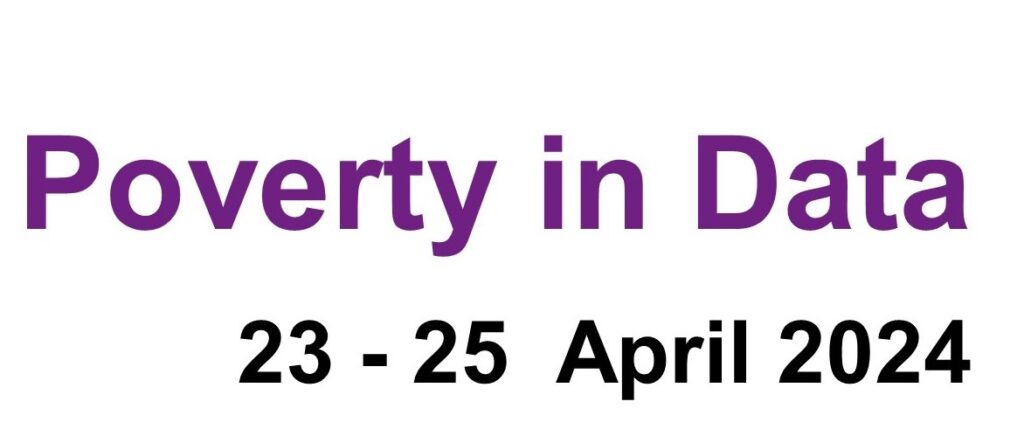We’re delighted to have a wide variety of fantastic contributors to our Poverty in Data event which takes place over three sessions next week, April 23-25! In this blog post we introduce our speakers for each of the sessions. You can find out more information about the times of the events and how to register on our website.
Tuesday 23 April – Early Careers Researcher Workshop
 Professor Donald Hirsch has been analysing trends and policies related to poverty and low income for over four decades. In the 1980s he was a journalist, latterly on The Economist. In the 1990s, after a period at the OECD, he was an international policy consultant, and between 1998 and 2008 the Joseph Rowntree Foundation’s Poverty Adviser. He played a central role in establishing the Minimum Income Standard for the United Kingdom (MIS), joining Loughborough’s Centre for Research in Social Policy (CRSP) in 2008 to lead the MIS work. He was Director of the Centre from 2012 to 2022. Since retiring from Loughborough, he has been policy adviser to abrdn Financial Fairness Trust, which funds a range of research related to income, assets and spending.
Professor Donald Hirsch has been analysing trends and policies related to poverty and low income for over four decades. In the 1980s he was a journalist, latterly on The Economist. In the 1990s, after a period at the OECD, he was an international policy consultant, and between 1998 and 2008 the Joseph Rowntree Foundation’s Poverty Adviser. He played a central role in establishing the Minimum Income Standard for the United Kingdom (MIS), joining Loughborough’s Centre for Research in Social Policy (CRSP) in 2008 to lead the MIS work. He was Director of the Centre from 2012 to 2022. Since retiring from Loughborough, he has been policy adviser to abrdn Financial Fairness Trust, which funds a range of research related to income, assets and spending.
He established the original basis for a UK-wide living wage, now paid by thousands of employers. His work has contributed to strategies to combat child poverty and fuel poverty. It provided an evidence base for a more generous legal aid means test, announced in 2022. It gives charities tools to prioritise financial aid for families in need.
We will also have a panel of former Data Impact Fellows on this day, you can find out more about them in last week’s blog post!
Wednesday 24 April – Perspectives on Poverty
 Christina Adane will be speaking about her work in poverty activism and on the current issues that are impacting people.
Christina Adane will be speaking about her work in poverty activism and on the current issues that are impacting people.
Christina was founding co-chair of Bite Back’s youth board, a youth-led movement fighting the injustices of the food industry. She fronted national campaigns over the years such as extending free school meal provision over lockdown, which garnered 450,000 signatures on her petition which led to a government U-turn in the May half-term. Marcus Rashford then spearheaded this campaign during the summer holidays.
Her work in food and advocacy has been featured at length in The Guardian, i_D, The Financial Times, The Telegraph, The Big Issue, the BBC, The Independent and many more. Christina also directed her own program on Radio 4 called ‘My Name is Christina.’ Christina received her first accolade at 16, when she was named one of the BBC’s 100 most influential women in the world.

Nissa Finney will be speaking about the recently launched Evidence for Equality National Survey which provides novel data on experience and inequalities for ethnic and religious minorities in Britain. She will focus on the importance of inclusive data, and challenges of producing them and achieving impact.
Nissa is Professor of Human Geography at the University of St Andrews. She has researched, taught and published widely on ethnic inequalities, residential mobility, housing, neighbourhood change, segregation and research methods. She is a member of the Centre for Population Change (CPC) and a founding member of the Centre on the Dynamics of Ethnicity (CoDE). Within CoDE, Nissa leads the EVENS Survey, a new national survey – available via the UK Data Service – that documents the lives of ethnic and religious minorities with the aim of providing evidence to address inequalities. The free-to-download EVENS Book, ‘Racism and Ethnic Inequality in a Time of Crisis’ (Policy Press 2023) evidences socio-economic (and other) disadvantages of many minoritised ethnic groups in Britain. Nissa has also undertaken work on poverty and ethnicity with the Joseph Rowntree Foundation and the Centre for Homelessness Impact.

Social Justice Chester (Dr Kim Ross, Dr Nancy Evans, Dr Holly White and Jenn Robinson) are a research group based in the Department of Social and Political Science at the University of Chester. Their research aims to address social harms and is underpinned by a participatory approach. They are advocates for the role that universities can have in making a positive change within their local communities and regions. The groups work to date includes an evaluation project for West Cheshire Foodbank, the creation of a framework of co-production to be utilised by local stakeholders, and an interactive research exhibition showcasing the lived reality of poverty co-produced with West Cheshire Community Inspirers.


West Cheshire Community inspirers are individuals with lived or living experience of poverty or hardship which may include things such as experience of using a foodbank, homelessness or housing difficulties, mental health challenges and financial hardship. Inspirers share their experiences and use their voice to bring about change, to ensure other people do not suffer in the same way and that services are fit for everyone, making a fairer society for all. Community Inspirers work with the Cheshire West Poverty Truth Team, local civic bodies, business and the University of Chester to address poverty and identify its root cause.
“To be a community inspirer takes tenacity, a belief to make true changes to society for the good of all, a heart of gold, and a mind of an anarchist’.
Thursday 25 April – Research, policy and next steps

Ed Davies – Policy Director, The Centre for Social Justice
Ed first joined the Centre for Social Justice in 2016 but recently returned following a couple of years in government as an expert adviser to several Health Secretaries. Prior to his career in Westminster he was a journalist with a specialism in health policy, including seven years as a senior editor at the British Medical Journal based in the UK and US.

Helen Barnard – Director of Policy, Research and Impact, The Trussell Trust
Helen Barnard is Director of Policy, Research and Impact at the Trussell Trust. She was formerly Director of the Joseph Rowntree Foundation and Research and Policy Director at Pro Bono Economics. She is a leading national expert on poverty, inequality and social policy. Her extensive body of research and policy work have covered poverty, destitution, labour markets, housing, social security and civil society. She is author of ‘Want (Giants: a new Beveridge Report)’ which examines modern day poverty and the institutions and reforms required to address it.

Lalitha Try – Economist, Resolution Foundation
Lalitha joined the Foundation in April 2021. Her work focuses on living standards, poverty, inequality and welfare. Before joining the Foundation, she worked at the Joseph Rowntree Foundation. Lalitha has an MSc in Inequalities and Social Science and a BA in Politics from the University of Leeds.

Peter Matejic – Chief Analyst, The Joseph Rowntree Foundation
Before joining JRF, Peter worked for almost 20 years in the Civil Service. He led on a number of issues at the Department of Work and Pensions, including poverty analysis, policies, and developing measures for persistent poverty and child poverty. Previously, he worked on fuel poverty and energy price analysis. Peter is interested in all elements of poverty measurement and is passionate about making sure analysis has impact. He oversees JRF’s monitoring strategy and research reports.
You can find out more information about the times of the events and how to register on our website.

